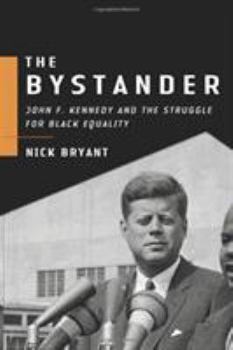The Bystander: John F. Kennedy and the Struggle for Black Equality
Select Format
Select Condition 
Book Overview
In this, the first comprehensive history of Kennedy's civil rights record over the course of his entire political career, Nick Bryant shows that Kennedy's shrewd handling of the race issue in his... This description may be from another edition of this product.
Format:Hardcover
Language:English
ISBN:0465008267
ISBN13:9780465008261
Release Date:May 2006
Publisher:Perseus Books
Length:545 Pages
Weight:1.62 lbs.
Dimensions:1.5" x 6.8" x 9.5"
Related Subjects
20th Century African Americans African-American & Black African-American Studies Civil Rights & Liberties Ethnic & National History Modern (16th-21st Centuries) Political Science Politics & Government Politics & Social Sciences Social Science Social Sciences Specific Demographics Specific TopicsCustomer Reviews
5 ratings
JFK and understanding the Black community
Published by Thriftbooks.com User , 16 years ago
An interesting look at the junior JFK and how he shaped his view of the Black community and his understanding of how to move up in politics.
Civil Rights or Bust
Published by Thriftbooks.com User , 17 years ago
This book is one of the more objective books about President Kennedy. It explores his seemingly lackadaisical attitude in re civil rights. He is described as being charismatic, yet lacking in personal depth. He was excellent at taking written material, courtesy of his speech/script writers and giving an outstanding performance. This is not to discredit the man's obvious intelligence and ability to respond to the issues and questions of the day. His alliances with people who were known segregationists don't exactly point him in the direction of civil rights activists. His brother, then attorney general Robert Kennedy was the fire, the drive, the passion and commitment to civil rights. While the civil rights/racial equality issue is the main focus of this book, other issues during the New Frontier are also explored. This is a well written book that will certainly maintain the interest of readers.
A Balanced Account
Published by Thriftbooks.com User , 17 years ago
This is solid history. It is a fair and careful account of JFK's failure to pursue a civil rights agenda. It is the very opposite of a hatchet job: the author makes every attempt to look at events from President Kennedy's standpoint, but concludes that JFK dropped the ball. This should not be surprising: JFK was the sort of politician who once gave an empassioned speech to farmers in West Virginia and then said to an aide with a grin "FFN" (meaning "f*ck the farmers after November"). What's interesting about this book is the way the political Left has either ignored it or unfairly attacked it. Unable or unwilling to come to grips with its past, the Left provides no guidance for those who take up the torch. Enamored of their charismatic Presidents, Democrats make no demands on them, either while they are in office or afterwards, when they are of mere historical interest. The result is that they are willing to overlook the clay feet of their heroes and underrate the achievements of their Presidents with less charm but more substance. The tragedy of the Democrats is that with every election, they get more frustrated at their lack of success (even when they win), but are absolutely clueless why that is so. Their idolization of JFK (and lack of respect for honest and accomplished books like this) ought to show them why, but never will.
A JFK Page-Turner
Published by Thriftbooks.com User , 17 years ago
I came to this book from the standpoint of an observer with a general interest in American politics and history rather than from a purely academic standpoint. I have enjoyed it immensely having found it both detailed and informative reflecting exhaustive research. Nick Bryant gives a real insight into how civil rights fitted into the wider political ambitions of the Kennedy machine. Would Kennedy once in office be as true to the civil rights cause as his pre-election manoeuvrings suggested and if so, when, and what would be the catalyst? It is this question that made the book a real page-turner.
Another view of JFK
Published by Thriftbooks.com User , 17 years ago
Most of Kennedy's biographers fall into two camps; hagiographers like Goodwin and Schlesinger and dozens of others, or much more honest examinations of the character of the man like Thomas Reeves very good book. The hags have outnumbered the wags by at least ten to one, but this book is a good addition to the latter camp. This way-too-long book has many good examples of how JFK really did not have some burning commitment to civil rights (or much of anything else for that matter) and was really a fairly shallow man with good speech writers who could turn a phrase and have Kennedy deliver it with passion. His willingness to appoint segregationists such as William Cox to the federal bench and his friendships with Senate bigots such as Al Gore Sr. and Bill Clinton's hero, William Fulbright, shows him to be far less the advocate of civil rights than his hagiographers have made him out to be. Much of this book is focused on the civil rights for blacks movement, but there are some good insights into other issues that were front and center at the time.





